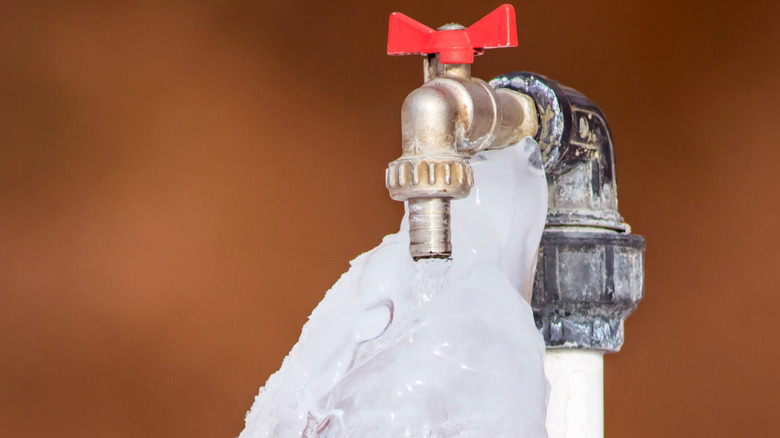Crucial Advice for Avoiding Frozen Pipes in Winter Conditions
Crucial Advice for Avoiding Frozen Pipes in Winter Conditions
Blog Article
Just about everyone has their unique perception involving Preventing and dealing with frozen pipes.

Cold weather can wreak havoc on your pipes, especially by freezing pipelines. Below's how to stop it from taking place and what to do if it does.
Intro
As temperature levels decrease, the risk of frozen pipes boosts, potentially leading to pricey fixings and water damages. Comprehending how to stop frozen pipes is critical for home owners in chilly climates.
Avoidance Tips
Insulating at risk pipes
Cover pipes in insulation sleeves or make use of warm tape to shield them from freezing temperatures. Concentrate on pipes in unheated or outside locations of the home.
Heating strategies
Keep interior areas adequately heated up, specifically areas with plumbing. Open cupboard doors to permit warm air to circulate around pipes under sinks.
Exactly how to recognize icy pipelines
Look for reduced water circulation from faucets, unusual odors or sounds from pipelines, and visible frost on subjected pipes.
Long-Term Solutions
Architectural modifications
Consider rerouting pipes far from exterior walls or unheated locations. Add extra insulation to attic rooms, basements, and crawl spaces.
Upgrading insulation
Buy premium insulation for pipes, attics, and wall surfaces. Correct insulation helps keep regular temperatures and reduces the risk of frozen pipelines.
Securing Exterior Plumbing
Yard hoses and outside taps
Detach and drain pipes garden hose pipes prior to winter season. Set up frost-proof faucets or cover exterior faucets with protected caps.
Recognizing Frozen Pipes
What triggers pipelines to ice up?
Pipelines freeze when exposed to temperatures listed below 32 ° F (0 ° C) for extended periods. As water inside the pipelines ices up, it increases, taxing the pipeline wall surfaces and possibly creating them to burst.
Risks and damages
Frozen pipelines can bring about water supply disruptions, building damage, and expensive repairs. Ruptured pipelines can flooding homes and trigger comprehensive structural damages.
Indicators of Frozen Pipeline
Identifying icy pipelines early can prevent them from bursting.
What to Do If Your Pipes Freeze
Immediate activities to take
If you believe frozen pipes, maintain faucets open up to eliminate pressure as the ice thaws. Utilize a hairdryer or towels soaked in warm water to thaw pipes gradually.
Conclusion
Protecting against frozen pipelines needs aggressive steps and fast reactions. By comprehending the causes, indications, and safety nets, property owners can shield their plumbing during cold weather.
Helpful Tips to Prevent Frozen Pipes this Winter
UNDERSTANDING THE BASICS: WHY PIPES FREEZE AND WHY IT’S A PROBLEM
Water freezing inside pipes is common during the winter months, but understanding why pipes freeze, and the potential problems it can cause is crucial in preventing such incidents. This section will delve into the basics of why pipes freeze and the associated problems that may arise.
THE SCIENCE BEHIND FROZEN PIPES
When water reaches freezing temperatures, it undergoes a physical transformation and solidifies into ice. This expansion of water as it freezes is the primary reason pipes can burst. As the water inside the pipe freezes, it expands, creating immense pressure on the walls. If the pressure becomes too great, the pipe can crack or rupture, leading to leaks and water damage.
FACTORS THAT CONTRIBUTE TO PIPE FREEZING
Low Temperatures: Extremely cold weather, especially below freezing, increases the risk of pipes freezing. Uninsulated or Poorly Insulated Pipes: Pipes located in unheated areas, such as basements, crawl spaces, or attics, are more prone to freezing. Insufficient insulation or lack of insulation altogether exacerbates the problem. Exterior Wall Exposure: Pipes running along exterior walls are susceptible to freezing as they encounter colder temperatures outside. Lack of Heating or Temperature Regulation: Inadequate heating or inconsistent temperature control in your home can contribute to frozen pipes. PROBLEMS CAUSED BY FROZEN PIPES
- Pipe Bursting: As mentioned earlier, the expansion of water as it freezes can cause pipes to burst, resulting in significant water damage.
- Water Damage: When pipes burst, it can lead to flooding and water damage to your property, including walls, ceilings, flooring, and personal belongings.
- Structural Damage: Prolonged exposure to water from burst pipes can compromise the structural integrity of your home, leading to costly repairs.
- Mold and Mildew Growth: Excess moisture from water damage can create a favorable environment for mold and mildew growth, posing health risks to occupants.
- Disrupted Water Supply: Frozen pipes can also result in a complete or partial loss of water supply until the issue is resolved.
WHY CERTAIN PIPES ARE MORE PRONE TO FREEZING
- Location: Pipes located in unheated or poorly insulated areas, such as basements, crawl spaces, attics, or exterior walls, are at higher risk of freezing.
- Exterior Pipes: Outdoor pipes, such as those used for irrigation or exposed plumbing, are particularly vulnerable to freezing as they are directly exposed to the elements.
- Supply Lines: Pipes that carry water from the main water supply into your home, including the main water line, are critical to protect as freezing in these lines can affect your entire plumbing system.
- Underground Pipes: Pipes buried underground, such as those connected to sprinkler systems or outdoor faucets, can be susceptible to freezing if not properly insulated.
https://busybusy.com/blog/helpful-tips-to-prevent-frozen-pipes-this-winter/

We hope you enjoyed our topic on How to Prevent Your Pipes From Freezing. Thank you for spending some time to browse our piece. Enjoyed our review? Please share it. Help others find it. Thanks a lot for your time spent reading it.
Schedule Service Report this page